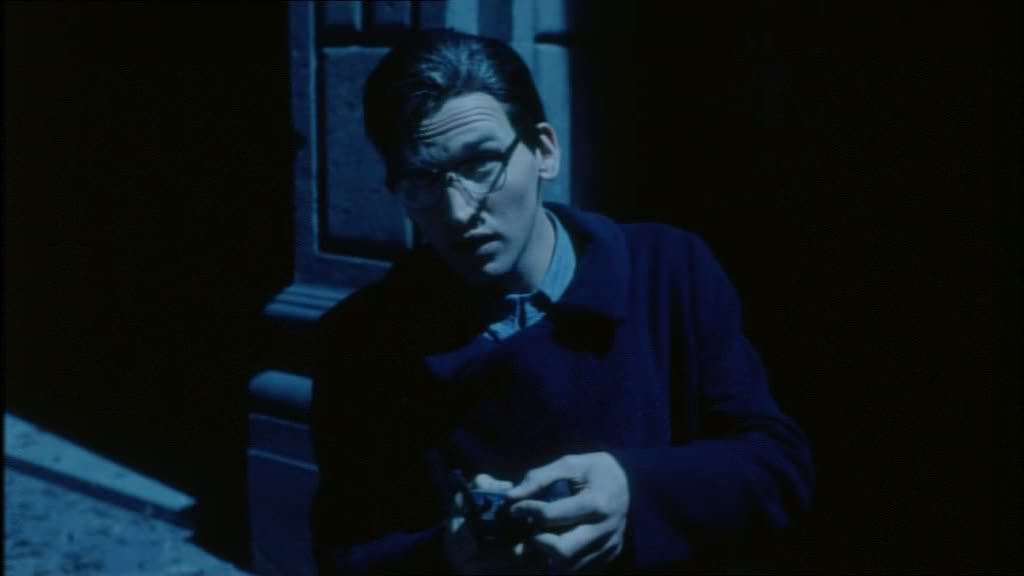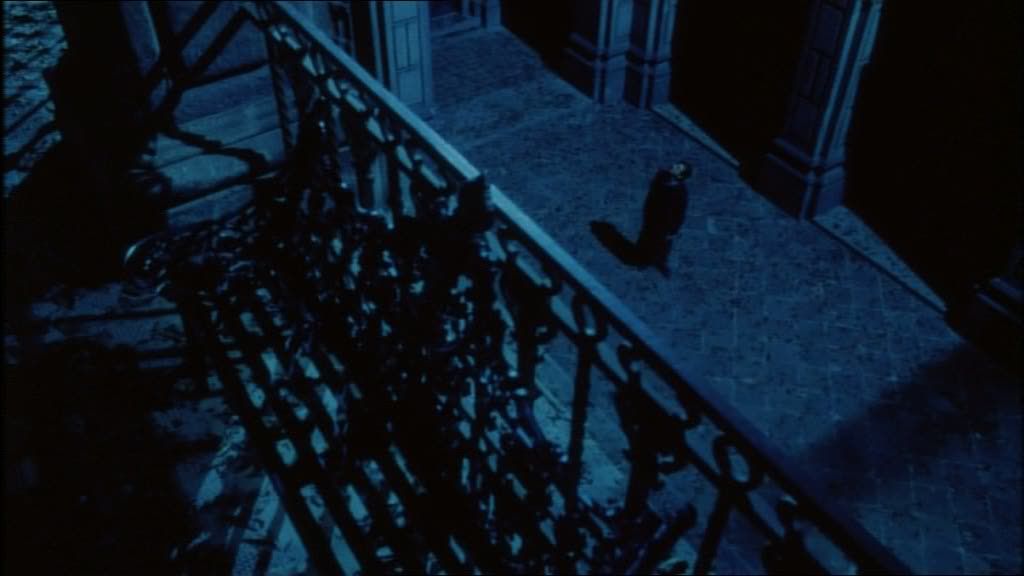
Christopher Eccleston's career start had two sides: One that was traditional for most newcomers ('Casualty', Morse and Poirot) and the other that was very less so. Definite highlight from the latter is
Death and the Compass
Originally a TV film from 1992, it was expanded to full feature format in 1995. Based on Jorge Luis Borges short story and directed by Alex Cox.
Eccleston plays quite a multifaceted role, a triad of characters; relationship between them and also with other personae in the film could become extremely complicated, depending on the certain viewer's approach. The film differs from other director's endeavours, because of its clean-cut style and tightness of the narrative as well as presentation - still never loosing the specifics of Borges' Byzantine world.
One-of film, a unique performance, and yet, 'Death and the Compass' is absent from practically all Eccleston's filmography shortlists, and rarely mentioned. Is there a particular reason for this omission? Does the film deserve better or are the things as they should be? What in your opinion is this film's place?
Death and the Compass
Originally a TV film from 1992, it was expanded to full feature format in 1995. Based on Jorge Luis Borges short story and directed by Alex Cox.
Eccleston plays quite a multifaceted role, a triad of characters; relationship between them and also with other personae in the film could become extremely complicated, depending on the certain viewer's approach. The film differs from other director's endeavours, because of its clean-cut style and tightness of the narrative as well as presentation - still never loosing the specifics of Borges' Byzantine world.
One-of film, a unique performance, and yet, 'Death and the Compass' is absent from practically all Eccleston's filmography shortlists, and rarely mentioned. Is there a particular reason for this omission? Does the film deserve better or are the things as they should be? What in your opinion is this film's place?



5 comments:
I suspect that the main reason for it's omission in discussions about Eccleston's work is that Death and the Compass is a pretty demanding film - probably the most challenging work of his that I've seen. Borges doesn't exactly lend himself to a nice, clean linear narrative :-)
That being said, I think Eccleston did some pretty brilliant work in the film - particularly in the last few scenes.
Karen:
You have summed up my thoughts exactly-I found the first part of the movie a bit confusing-but as it wore on, I thought it quite brilliant. Lovely use of primary colors, for example-its visually challenging and impressive at the same time and creatively scored.
The movie had a rocky road to accessibility so that may account for the omission also.
That being said, Eccleston OWNS the last few scenes. Its very rock and roll and I loved it. All due respect to the late Heath Ledger and his work, it made me wonder if he or the director (Brit?) of the latest Batman had seen that performance when planning for the Joker.
The detective investigation is an all right red thread through the movie imo.
Actually I find that, say, 'Our Friends In The North' and its whiplash storytelling technique requires more conscious effort from me as a viewer than the lavish mad realm of DatC. Which by the way is very controlled, the madness - try and watch the unforgettable 'Walker' for illustration what happens when Alex Cox pulls out all the stops.
And overall, isn't the representation of variety more attractive, also from a journalistic p.o.v.?
I am probably late to the party here. Been a bit tied up. I think that Death and the Compass gets left out just because a lot of people don't know how to take it. I have seen it alone and with friends. It is always interesting to see how people react to it, and some people just can't follow the story telling. That being said, I love it. He was brilliant especially at the end (I know it's been said before but too much can't be said about him in the last scenes). The other thing that I wanted to mention was how ever present he was in the film, as the reporter, the man in the pub, making Red seem everywhere.
Oh, in response to what someone said, Yes, Christopher Nolan who directed The Dark Knight is a Brit, and I did wonder if he or Ledger had seen it. Kind of the same school of villain really.
Better late than never, Kitsa.
I don't know. For example, many people can't stomach sci-fi. Still, 'Doctor Who' is thought more or less unanimously a milestone for his role in it.
Good remark about the presence - it's a very telling feature of the world depicted.
Post a Comment